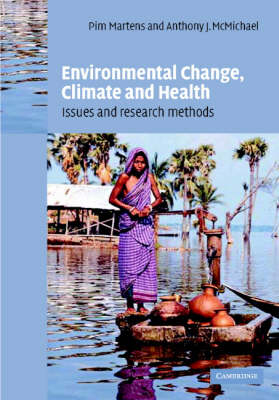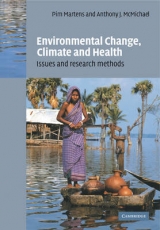
Environmental Change, Climate and Health
Cambridge University Press (Verlag)
978-0-521-78236-4 (ISBN)
- Titel erscheint in neuer Auflage
- Artikel merken
The advent of global environmental change, with all its uncertainties and requirement for long-term prediction, brings new challenges and tasks for scientists, the public and policy makers. A major environmental upheaval such as climate change is likely to have significant health effects. Current mainstream epidemiological research methods do not always adequately address the health impacts that arise within a context in which the ecological and other biophysical processes display non-linear and feedback-dependent relationships. The agenda of research and policy advice must be extended to include the larger-framed environmental change issues. This book identifies the nature and scope of the problem, and explores the conceptual and methodological approaches to studying these relationships, modelling their future realisation, providing estimates of health impacts, and communicating the attendant uncertainties. This timely volume will be of great interest to health scientists and graduate students with an interest in the effects of global environmental change.
PIM MARTENS holds degrees in Biological and Environmental Health Sciences from Maastricht University, The Netherlands. He worked within the project 'Global Dynamics and Sustainable Development', launched in 1992 by the Dutch National institute of Public Health and the Environment (RIVM). After obtaining his PhD from the Department of Mathematics, Maastricht University, he worked as assistant professor at the same Department. Since 1998, Pim Martens has been a senior researcher at the University's International Centre for Integrative Studies, where he directs the Global Assessment Centre. In 2001 he became an Honorary Senior Lecturer, Department of Epidemiology and Population Health, London School of Hygiene and Tropical Medicine, UK. He is editor-in-chief of the international journal Global Change and Human Health and editor of a book series on Resurgent and Emerging Infectious Diseases. Furthermore, he is a member of the Assessment Study Climate, Ecosystems, Infectious Disease, and Human Health (USNational Research Council/National Academy of Sciences), and lead-author of several climate change and human health assessment reports of the Intergovernmental Panel on Climate Change (IPCC), and the World Health Organization (WHO). TONY MCMICHAEL is a medical graduate from Adelaide, South Australia. He is currently Professor of Epidemiology at the London School of Hygiene and Tropical Medicine, UK. His research interests, over 30 years, have encompassed the social aetiology of mental health problems, the causes of occupational diseases, studies of diet and cancer, and environmental epidemiology. During the 1990s he developed a strong interest in the assessment of population health risks from global environmental change. His current research activities include studies of heatwave impacts on urban mortality patterns, of solar ultraviolet radiation and immune disorders, of dietary factors in breast cancer, and the mathematical modelling of future climate change impacts on malaria transmissibility. Between 1994 and 1998 he convened the review by the UN's Intergovernmental Panel on Climate Change (Second Assessment Report) of potential health impacts of climate change. He is doing likewise for the IPCC's Third Assessment Report (1999-2001). He is a member of WHO's newly established Advisory Committee on Globalisation and Health, and a Council member of the newly-formed World Health Policy Forum (focusing on food and health policy).
1. Global environmental changes: anticipating and assessing risks to health A. J. McMichael and P. Martens; 2. Historical connections between climate, medical thought and human health A. G. Carmichael and M. Fleming Moran; 3. The contribution of global environmental factors to ill-health K. R. Smith and M. Desai; 4. Surprise, nonlinearity and complex behavior T. Awerbuch, A. E. Kiszewski and R. Levins; 5. Epidemilogic and impacts assessment methods K. L. Ebi and J. A. Patz; 6. Retrospective studies: analogue approaches describing climate variability and health R. S. Kovats and M. Bouma; 7. Detecting the infectious disease consequences of climate change and extreme weather events P. R. Epstein; 8. Integrated assessment modelling of human health impacts P. Martens, J. Rotmans and D. Rothman; 9. Remote sensing, GIS, and spatial statistics: powerful tools for landscape epidemiology L. R. Beck, U. Kitron and M. R. Bobo; 10. Monitoring the health impacts of global climate change D. H. Campbell-Lendrum, P. Wilkinson, K. Kuhn, R. S. Kovats, A. Haines, B. Menne and T. W. Parr; 11. Epidemiology, environmental health and global change A. Woodward; 12. Dealing with scientific uncertainties T. O. Riordan and A. J. McMichael.
| Erscheint lt. Verlag | 22.8.2002 |
|---|---|
| Zusatzinfo | 16 Tables, unspecified; 1 Plates, color; 1 Halftones, unspecified; 34 Line drawings, unspecified |
| Verlagsort | Cambridge |
| Sprache | englisch |
| Maße | 182 x 255 mm |
| Gewicht | 914 g |
| Themenwelt | Medizin / Pharmazie ► Medizinische Fachgebiete ► Arbeits- / Sozial- / Umweltmedizin |
| Studium ► Querschnittsbereiche ► Klinische Umweltmedizin | |
| Naturwissenschaften ► Geowissenschaften ► Meteorologie / Klimatologie | |
| Technik ► Umwelttechnik / Biotechnologie | |
| Wirtschaft | |
| ISBN-10 | 0-521-78236-8 / 0521782368 |
| ISBN-13 | 978-0-521-78236-4 / 9780521782364 |
| Zustand | Neuware |
| Informationen gemäß Produktsicherheitsverordnung (GPSR) | |
| Haben Sie eine Frage zum Produkt? |
aus dem Bereich


